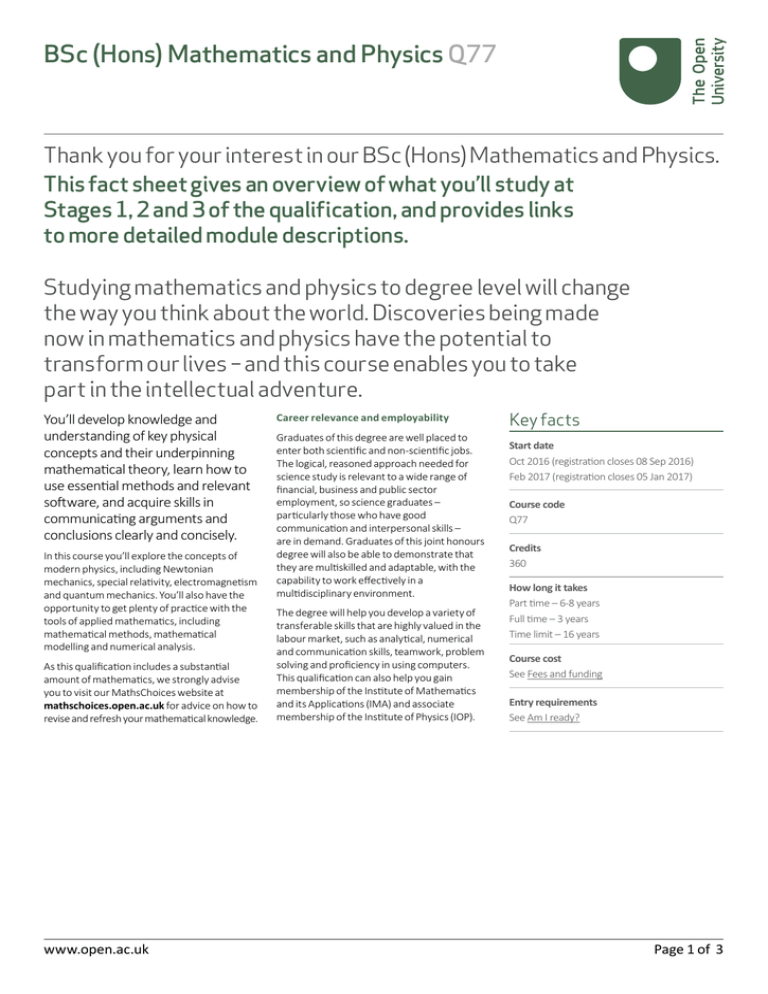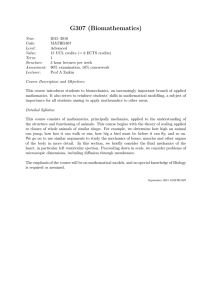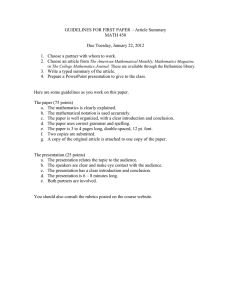BSc (Hons) Mathematics and Physics
advertisement

BSc (Hons) Mathematics and Physics Q77 Thank you for your interest in our BSc (Hons) Mathematics and Physics. This fact sheet gives an overview of what you’ll study at Stages 1, 2 and 3 of the qualification, and provides links to more detailed module descriptions. Studying mathematics and physics to degree level will change the way you think about the world. Discoveries being made now in mathematics and physics have the potential to transform our lives – and this course enables you to take part in the intellectual adventure. You’ll develop knowledge and understanding of key physical concepts and their underpinning mathematical theory, learn how to use essential methods and relevant software, and acquire skills in communicating arguments and conclusions clearly and concisely. In this course you’ll explore the concepts of modern physics, including Newtonian mechanics, special relativity, electromagnetism and quantum mechanics. You’ll also have the opportunity to get plenty of practice with the tools of applied mathematics, including mathematical methods, mathematical modelling and numerical analysis. As this qualification includes a substantial amount of mathematics, we strongly advise you to visit our MathsChoices website at mathschoices.open.ac.uk for advice on how to revise and refresh your mathematical knowledge. www.open.ac.uk Career relevance and employability Graduates of this degree are well placed to enter both scientific and non-scientific jobs. The logical, reasoned approach needed for science study is relevant to a wide range of financial, business and public sector employment, so science graduates – particularly those who have good communication and interpersonal skills – are in demand. Graduates of this joint honours degree will also be able to demonstrate that they are multiskilled and adaptable, with the capability to work effectively in a multidisciplinary environment. The degree will help you develop a variety of transferable skills that are highly valued in the labour market, such as analytical, numerical and communication skills, teamwork, problem solving and proficiency in using computers. This qualification can also help you gain membership of the Institute of Mathematics and its Applications (IMA) and associate membership of the Institute of Physics (IOP). Key facts Start date Oct 2016 (registration closes 08 Sep 2016) Feb 2017 (registration closes 05 Jan 2017) Course code Q77 Credits 360 How long it takes Part time – 6-8 years Full time – 3 years Time limit – 16 years Course cost See Fees and funding Entry requirements See Am I ready? Page 1 of 3 BSc (Hons) Mathematics and Physics Q77 What you will study Stage 1 Stage 2 Stage 3 120 credits required 120 credits required 120 credits required Stage 1 lays the foundation for the specialist studies in physics and applied mathematics that you’ll begin at Stage 2. This stage builds on the broad introduction to science and mathematics you met at Stage 1. It begins focusing on core topics in physics (classical mechanics, electrical and gravitational fields and potentials, electromagnetism and relativity, waves and optics, thermal and statistical physics, and quantum physics, with some applications to solids, atoms and nuclei) and applied mathematics (advanced calculus, linear algebra, numerical methods, and mathematical modelling). At Stage 3 you will start with your first choice from the physics options and progress through the stage alternating between your choice of physics and mathematics modules. You’ll start with a wide-ranging and absorbing introductory science module, Questions in science (S111), which encompasses astronomy and planetary science; biology; chemistry; Earth and environmental science; and physics. Essential mathematics 1 (MST124) covers the fundamentals of pure and applied mathematics including calculus, vectors, matrices, sequences and functions. Essential mathematics 2 (MST125) introduces topics essential for successful study of higher-level mathematics, such as geometric transformations, eigenvalues, mechanics and proof. www.open.ac.uk Page 2 of 3 BSc (Hons) Mathematics and Physics Q77 Module summary Click on module titles for detailed module descriptions. Qualification structure and module availability is subject to change. Stage 1 module summary Stage 2 module summary Stage 3 module summary 120 credits required 120 credits required 120 credits required Module name CREDITS CODE Compulsory modules – 120 credits Module name CREDITS CODE Compulsory modules – 120 credits Questions in science 60 S111 Essential mathematics 1 30 MST124 Essential mathematics 2 30 MST125 Module name CREDITS CODE Optional physics modules – 60 credits Select two from: Physics: from classical to quantum 60 S217 Mathematical methods, models and modelling 60 MST210 Astrophysics 30 S382 Electromagnetism 30 SMT359 The quantum world 30 SM358 The relativistic Universe 30 S383 Optional mathematics modules – 60 credits Select two from: Applications of probability 30 M343 Complex analysis 30 M337 Deterministic and stochastic dynamics 30 MS327 Graphs, networks and design 30 MT365 Mathematical methods and fluid mechanics 30 MST326 Optimization 30 M373 Page 3 of 3 FIND OUT MORE Go to the online description to find out more about how much time you need to study, how to apply, and your fees and funding options. www.open.ac.uk +44 (0)300 303 5303 Student Recruitment Team The Open University, PO Box 197 Milton Keynes, MK7 6BJ, United Kingdom Copyright 2016 © The Open University



